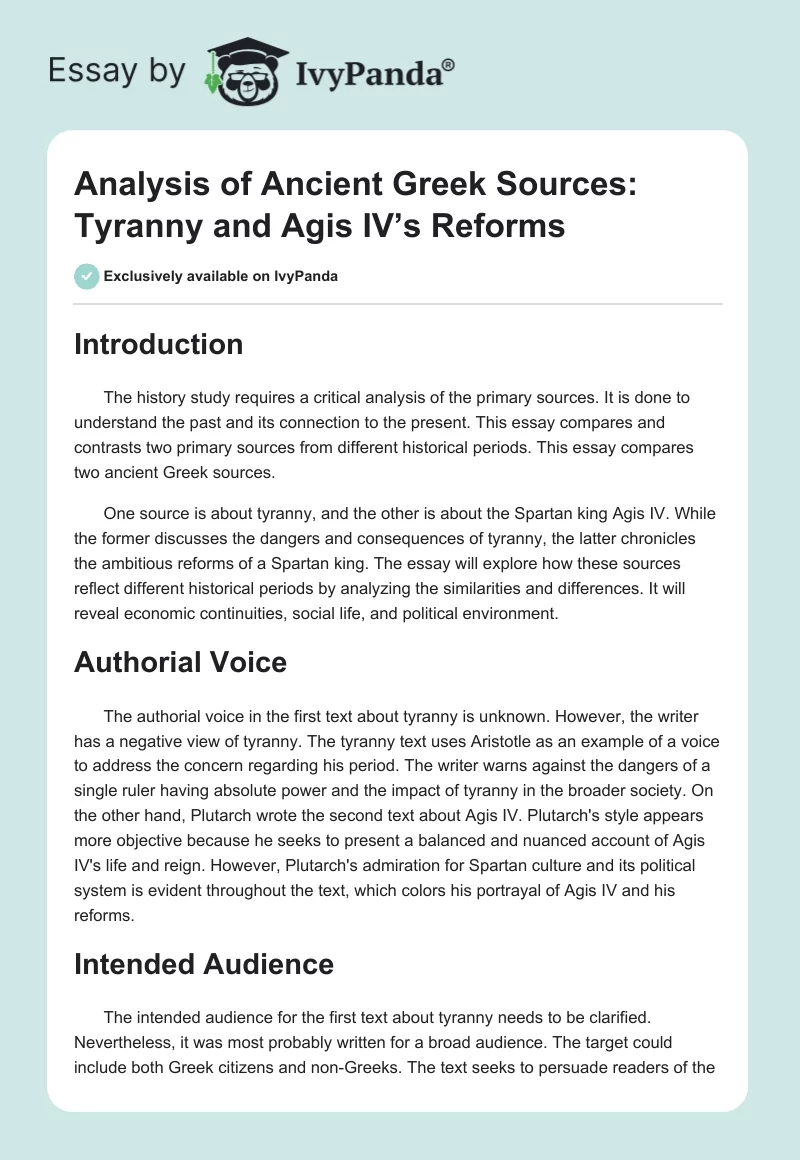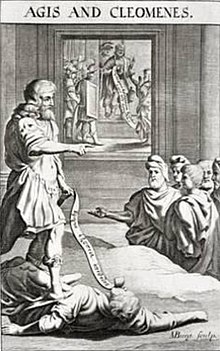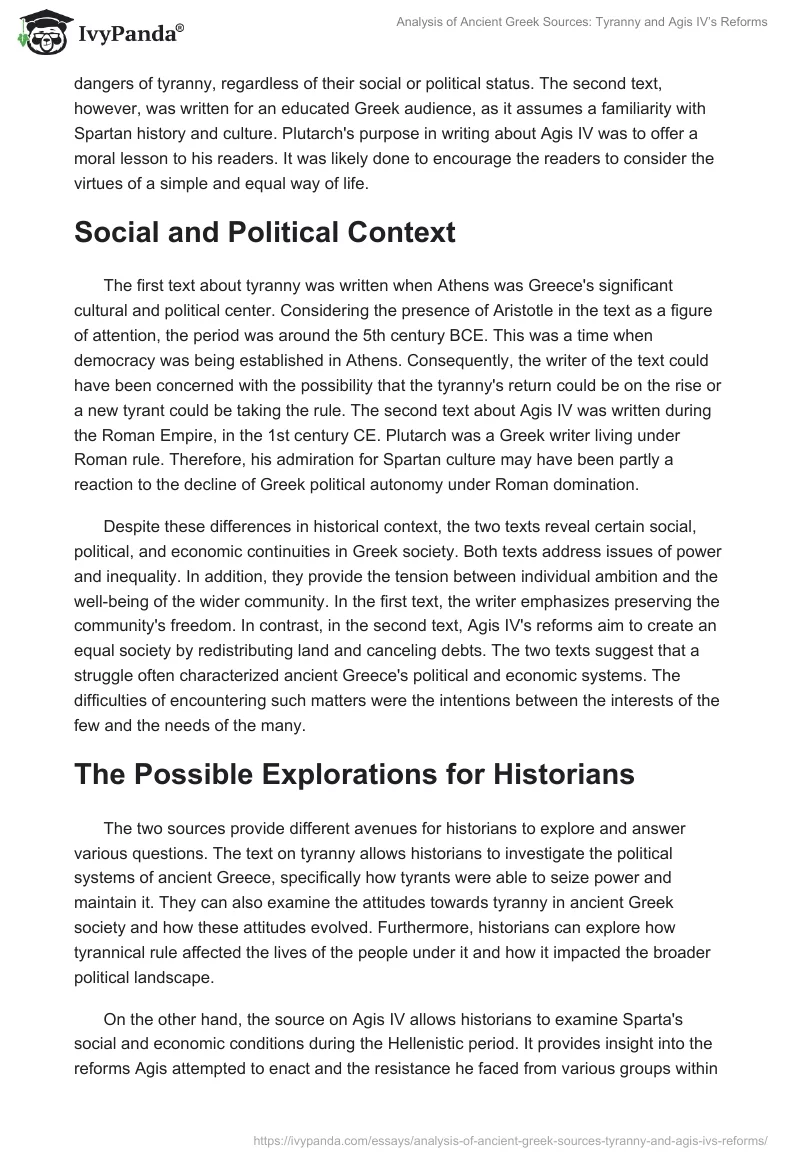Agis IV: The Spartan King Who Dreamed of Reform
Introduction
In the annals of ancient Greece, a myriad of leaders left indelible marks on their cities and people. Among these, the story of Agis IV stands out. As king of Sparta during a time of significant socio-political upheaval, Agis IV embarked on a path of reform that challenged long-standing traditions in one of the most steadfast of Greek city-states. His brief reign from 245 BC to 241 BC is often remembered for the bold, albeit contentious, efforts to restore Sparta to its former glory through radical social and economic changes. This article delves into the background, intentions, and implications of Agis IV's revolutionary policies.
Background of a Young King
Born into the Eurypontid line of Spartan kings, Agis IV ascended to the throne at a young age amidst a backdrop of decline for the once-mighty Sparta. The city-state had long thrived on its rigid hierarchical system and formidable military prowess, crystallized in the infamous Spartan lifestyle and governance. However, by the time Agis came to power, Sparta was a shadow of its former self. Economic disparity had widened drastically, with wealth concentrated among a limited number of aristocratic families while many citizens were mired in poverty. The rigid structures that had once served Sparta well now seemed to be its greatest hindrance.
Agis IV was not blind to these challenges. As a young monarch with a keen sense of responsibility and a vision for his kingdom, he was determined to initiate change. Influenced by the ethos of earlier Spartan values, Agis envisioned a renewal of the egalitarian military society that had defined Sparta at the height of its power.
The Vision for Reform
Agis IV's reform agenda was ambitious and wide-ranging, aiming to redress the socioeconomic imbalances that had permeated Spartan society. Central to his plan was a sweeping redistribution of land and wealth, which he believed was essential to reinstating the egalitarian principles of Lycurgus, the legendary lawgiver of Sparta.
The Spartan king proposed cancelling debts, effectively wiping the slate clean for those burdened by financial obligations. Furthermore, he sought to redistribute land to ensure that each Spartan citizen had enough property to sustain a living, thereby creating a larger, robust class of citizen-soldiers—the foundation of Spartan strength. By doing so, Agis aimed to restore a sense of unity and common purpose that had been eroded over time.
These plans were bolstered by broader social reforms, including the rejuvenation of the austere and disciplined upbringing in Spartan education (the agoge) and the remodelling of political institutions to reflect Lycurgan ideals. Agis IV’s vision was not merely a cosmetic overhaul but a deep structural transformation intended to revitalize the very essence of Spartan life.
Challenges and Opposition
Despite his noble intentions, Agis IV's proposals met with fierce resistance from within the Spartan ruling class. The entrenched Spartan elite, who stood to lose the most from such radical changes, were decidedly opposed. Their wealth and influence were rooted in the existing economic structures, and any change to this equilibrium was viewed as a threat to their status and power.
Powerful figures, including the co-ruling king, Leonidas II, vehemently opposed Agis’ ideas. Leonidas, having spent considerable time living in luxury in the East, was skeptical of Agis' envisioned return to traditional Spartan austerity. The conflict between the two kings epitomized the broader societal divide: a clash between traditional power dynamics and the exigency for reform.
Agis IV's challenge was to garner enough support from the broader citizenry, particularly from the disenfranchised segments who had the most to gain from his reforms. However, the deeply entrenched aristocracy, with their control over resources and influence in the Gerousia (the Spartan council of elders), posed formidable obstacles, complicating any attempts at swift implementation.
The Turbulent Path Forward
In an attempt to bypass opposition, Agis utilized the Assemblies, where he could directly appeal to the broader populace. His promises of debt forgiveness and land redistribution resonated with many, swelling support among the impoverished citizens and younger warriors who romanticized the glory days of a more united and formidable Sparta. Yet, despite this groundswell of support among the lower echelons, the struggle to achieve legislative change was an arduous one.
Faced with mounting opposition, Agis IV adopted a more radical political strategy by seeking to remove Leonidas from power. This move was both audacious and indicative of the dire need for immediate action perceived by Agis. Eventually, Agis succeeded in ousting Leonidas and temporarily paving the way for his reforms to begin taking shape.
Implementing Reforms
With Leonidas II temporarily exiled and the path seemingly cleared, Agis IV pressed forward with his reforms. The young king, already gaining a reputation as a revolutionary, accentuated his commitment by undertaking a symbolic renunciation of wealth. He and his family sacrificed substantial personal estates, amongst the largest in Sparta, to set a precedent for the redistribution of land. This act was intended to convince both supporters and skeptics of his sincerity and the necessity of the reforms.
Agis’ initial steps focused on the implementation of debt cancellation, a move that was met with relief and enthusiasm by those in financial jeopardy. This single act effectively freed countless Spartans from the shackles of debt, fostering hope for a more equitable society. The cancellation aimed not solely at delivering economic relief but also at eliminating barriers that hindered the Spartan citizen-soldier model from thriving.
Land redistribution, however, proved to be more complex and rife with challenges. Agrarian reform required precise planning and the cooperation of those who would be required to surrender land. Agis encountered staunch opposition here, as many landowners were reluctant to part with their holdings, which they considered both personal legacy and symbol of their social status. Despite these challenges, Agis undertook efforts to redraw Spartan land ownership, emphasizing the moral and civic duty, urging landowners to embrace the change for the prosperity of Sparta as a whole.
Moreover, Agis sought to restore the communal spirit of the agoge. This involved reinvigorating the state-supported educational system, reinforcing Spartan virtues such as discipline, endurance, and martial prowess. His focus was on producing capable warriors, echoing the military dominance that once defined the city-state. His reforms targeted the youth, instilling the idea that a united and reformed Sparta could rise to reclaim its ancient standing and honor.
The Power Struggle
Despite these advances, Agis IV's ambitions were far from secure. His reforms, daring and idealistic though they were, had destabilized traditional power structures. The conservative aristocracy, alongside Leonidas supporters, remained vigilant in their opposition, ready to pounce at the first sign of weakness. Agis’ rule, marked by fluctuating fortunes, eventually faced severe setbacks.
While Agis focused on implementing his policies, Leonidas II plotted his return. Leveraging his former alliances and support from those wary of Agis' transformative vision, Leonidas orchestrated his comeback with strategic precision. His efforts were bolstered by skepticism among some Spartan citizens, who feared the dramatic shift away from established norms could result in unintended consequences.
The return of Leonidas marked a significant setback for Agis IV. The political landscape shifted once more as Leonidas reclaimed his position as co-ruler, weakening Agis' influence and threatening the continuity of his reform agenda. The two leaders stood at loggerheads, representing divergent visions for Sparta's future.
The Downfall of Agis IV
Ultimately, the opposition to Agis' vision proved too powerful. Leonidas, exploiting his regained influence, took decisive steps to dismantle the reforms and undermine Agis’ authority. Through a combination of political maneuvering and leveraging societal fears, Leonidas worked to discredit Agis, painting his reform agenda as destabilizing and revolutionary to the point of jeopardizing Sparta’s fabric.
The once-sweltering support for Agis IV began to wane as Leonidas seized key strategic opportunities. Agis’ principal allies were gradually isolated, their influence diminished by the relentless onslaught from those opposed to change. This orchestrated opposition reached a climax with Agis’ arrest on charges of conspiracy against the traditional order.
The trial and execution of Agis IV stand as a tragic end to his ambitious but ultimately ill-fated campaign for reform. In 241 BC, Agis was executed, marking the premature end of his bold attempts to transform Sparta into a society reminiscent of its illustrious past. His death not only extinguished the hopes vested in him by his followers but served as a poignant reminder of the treacherous terrain of political reform.
Legacy and Reflections
Although Agis IV's life concluded in tragedy, his efforts reverberated through subsequent generations. His vision, while thwarted, inspired later reformers who sought to address the deeply entrenched issues within Spartan society. Agis IV remains a symbol of idealistic leadership, remembered for his courage in confronting systemic inequality.
Historically, Agis IV’s reign highlights the profound tension between tradition and reform, showcasing the delicate balance required to enact meaningful change. His story stimulates discussions about leadership, responsibility, and the potential pitfalls of challenging entrenched power.
Agis' brief reign serves as a lasting reminder of the complexities inherent in challenging the status quo. While his vision was not realized in his lifetime, it opened dialogue on the necessity of adaptation and change, offering valuable insights for those navigating the tumultuous path of reform, whether in ancient or modern worlds. As history reflects upon Agis IV's legacy, his story stands as a testament to the enduring struggle between change and preservation in the saga of human governance.
Comparative Analysis: Agis IV and Other Reformers
The story of Agis IV often invites comparisons with other historical figures who sought transformative change in their societies. These comparative analyses provide deeper insights into the challenges faced by reformers and the commonalities found in their journeys, despite the different contexts.
One such figure is Solon of Athens, renowned for his far-reaching economic reforms and his attempts to alleviate social strife in Athens nearly two centuries earlier. Like Agis, Solon recognized the debilitating impact of debt on citizens and sought to reform the system to foster greater equality. However, unlike Agis, Solon's reforms were executed with strategic compromise, allowing him to navigate the entrenched political structures more successfully. This contrasts sharply with Agis’ difficulties in overcoming resistance from the Spartan elite.
Closer to home, Agis IV’s efforts can also be compared to those of Cleomenes III, a later Spartan king. Cleomenes took up the mantle of reform with similar vigor, drawing inspiration from Agis' ideas. With striking parallels in their goals, Cleomenes sought to complete what Agis could not, implementing systems that aimed to revitalize Spartan society and counteract the inequities that had festered. Yet, the fate of Cleomenes echoes that of Agis, reflecting the persistent challenge of reforming deeply ingrained societal systems.
Both Agis and Cleomenes demonstrate the cyclical nature of reform efforts in Sparta, underscoring the persistent tension between innovation and tradition in Greek politics. These narratives are a testament to the enduring struggle against the status quo, emphasizing the necessity of adaptability and strategic foresight in the pursuit of societal change.
Lessons for Modern Governance
Agis IV’s narrative sheds light on enduring themes relevant to modern governance and reform. His story resonates with contemporary discussions about equity, fairness, and the challenge of implementing significant policy changes in the face of entrenched interests. The lessons from Agis’ attempts underscore the importance of coalition-building, communication, and patience when introducing reforms.
Modern policymakers can glean insights from Agis IV's successes and failures. His initial popularity illustrates the power of addressing socioeconomic needs and fostering dialogue with the populace. However, the subsequent backlash and Agis’ downfall highlight the critical need for broad-based support and strategic alliances to sustain reforms over time.
Additionally, Agis IV’s reign serves as a cautionary tale about the potential risks associated with rapid change. While transformation may be necessary, balancing continuity with innovation proves essential in mitigating backlash and ensuring lasting impact. For reformers today, understanding the historical context and acknowledging the complexities of change management remain crucial in navigating the intricacies of political and social reform.
The Enduring Legacy of Agis IV
Though his reign was brief and his reforms ultimately undone, the legacy of Agis IV continues to echo through history as a potent symbol of idealism and courage. His aspirations to return Sparta to its egalitarian roots, while thwarted, serve as an enduring reminder of the resilience required to challenge the established order.
Agis’ vision of a rejuvenated Sparta has found its place in the broader narrative of Greek history. His efforts underscore the enduring tension between conserving tradition and embracing transformation, a dynamic that resonates with societies across ages. Agis IV's life and legacy remind us that even in the face of adversity, the pursuit of a more equitable society remains a noble, if challenging, endeavor.
As we reflect upon Agis IV's story, we acknowledge the pivotal role of reformers in shaping the course of history. While Agis did not see his dreams fully realized, his courage in advocating for change laid a foundation for future generations, inspiring those who would continue the fight for justice and reform in Spartan society. His narrative remains a testament to the relentless human spirit, the perpetual quest for progress, and the transformative power of bold and visionary leadership.
In closing, Agis IV's tale serves as both inspiration and caution, inviting us to consider the complexities inherent in reform. His life asks us to reflect on our understanding of leadership, the balance between tradition and innovation, and the timeless quest to create a world where equity and justice prevail. Through the lens of Agis IV, we gain a deeper appreciation for the monumental task of reform and the enduring legacy of those who dare to dream beyond present limitations.






Comments